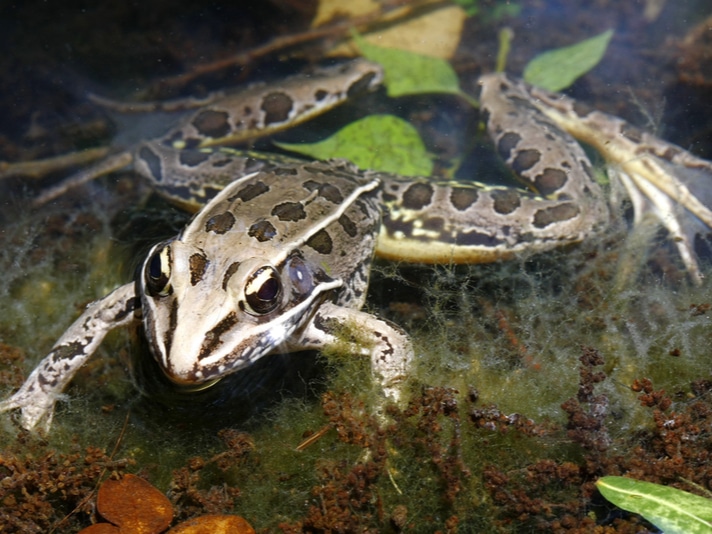Description:
If the proper environment is provided, the southern leopard frog will thrive under captive conditions. A 20 gallon aquarium should be the minimum size enclosure to accommodate this species. The cage should contain a large aquatic area, and southern leopard frogs should be able to fully submerge themselves in water. A bare minimum would be two inches of clean water with a plastic foam pad as a place for the frog to get out of the water. The water should be frequently changed to maintain water quality. Also integral to cage design is the use of both a basking bulb and a fluorescent UVB light source. In the wild, these animals spend some time basking and the use of these lights will be helpful in keeping these animals healthy in the long term. Aquatic and terrestrial vegetation is helpful in providing these secretive animals with a place to remain hidden from view. Ambient temperatures of 75 to 80 degrees Fahrenheit are considered ideal for the maintenance of this species. Slightly higher temperatures under the basking light allow the southern leopard frog to warm up if necessary. A cage top should be in place to prevent this animal, which can jump great distances, from leaving the enclosure. Crickets make a good staple food item. The diet can be supplemented with mealworms, silk worm larvae, earthworms, and occasionally, small rodents. Southern leopard frogs have a voracious appetite and can become obese if overfed. Gut loading crickets with a large variety of vegetables and commercially available cricket food is a good way to provide nutritious food items. Dusting food items with a vitamin/mineral supplement is also a good idea with this species, especially for younger animals still undergoing periods of rapid growth. This will help to ensure proper bone development.
Habitat:
The southern leopard frog is found in many types of shallow, freshwater environments. It even lives in slightly brackish marshes along the East Coast. Like the northern leopard frog, this frog can venture far from permanent water during periods of summer rains and utilize meadows and other terrestrial habitats.
Range:
Ranges from southern New York to southern Florida west to Texas, Kansas, Missouri and extreme southern Ohio.
Scientific Name: Lithobates utricularia
Species Group: frog
Family: Ranidae
Size: Typically ranges up to 3½ inches, although the record specimen was 5 inches in total length.
Level: beginner
Weight: N/A
Dangerous: No



